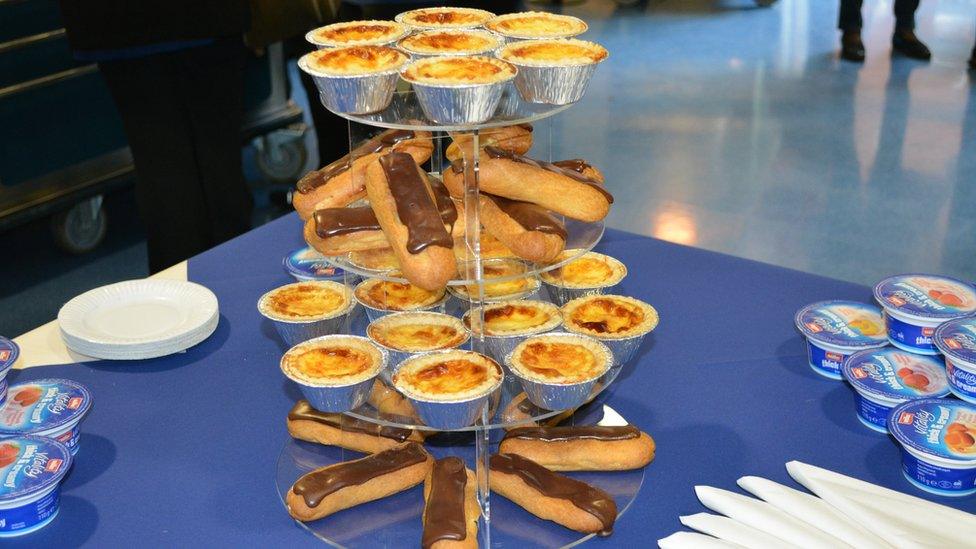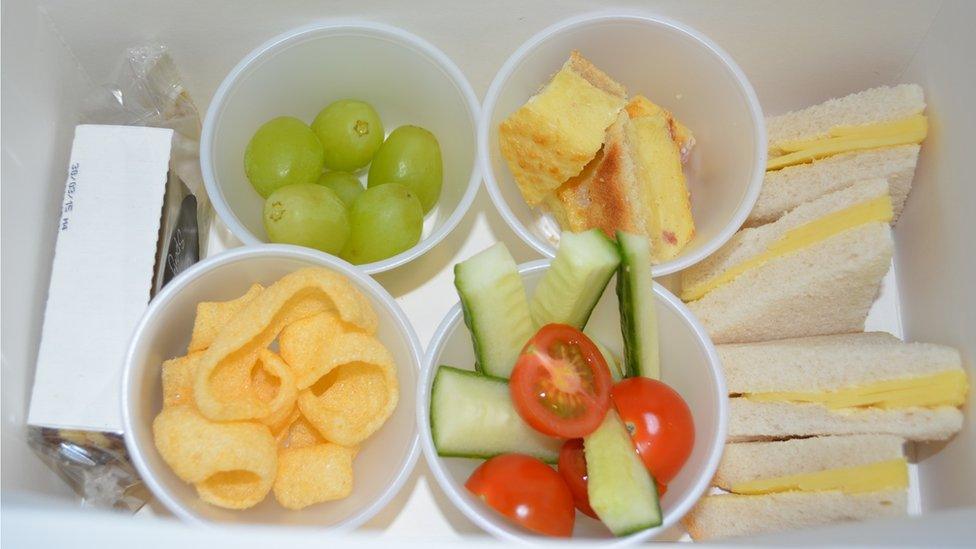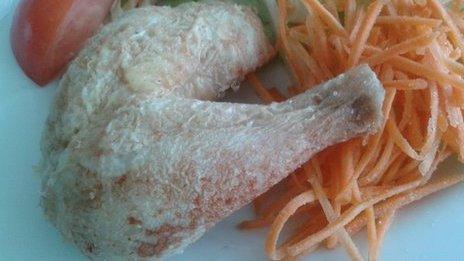'I put toast and cake back on the hospital menu'
- Published

Serving cakes to patients in the afternoons was a welcome move at Kingston Hospital
Patients at Kingston Hospital, in south-west London, used to say the food was a major disappointment.
When patients were asked for feedback, the poor quality of hospital meals was mentioned more often than anything else.
So Duncan Burton decided to do something about it - starting with the breakfasts.
Out went the limp bread and plain cereals and in came scrambled eggs, toast, porridge and fruit during the week, with sausages and bacon on offer at the weekends.
Despite the challenges of providing toasters around the hospital and not setting off fire alarms during the toasting process, he knew the extra hassle would be worth it.
"You can't have breakfast without toast," he says. "It's more reflective of what people have in their own home."
Mr Burton, who is director of nursing and patient experience at the acute hospital, where there are about 520 beds, knew that good nutrition and appetising food was fundamental to patients' healing and recovery.
He also knew it had an impact on general wellbeing.
With a high proportion of elderly in-patients, including many with dementia, Duncan and his team started reworking the menu with them in mind.
They were helped in their task by dieticians, caterers and patients themselves - but perhaps the most useful input came from hospital volunteers who sit with patients and help feed them.

Finger food is an alternative to hot meals for any adult patients who want it
They suggested finger food for those who wanted to eat only small amounts and for dementia patients because it was easier for them to eat.
So instead of being faced with an off-putting plate of non-descript meat, veg and mash, they are now given small bite-sized items such as small sandwiches, grapes, cucumber sticks and quiche slices.
That way, patients can eat a little and often, grazing throughout the day.
Rather than being offered an orange or an apple, which can be awkward to get into, they are given apple slices or a soft satsuma.
There are also new light meal options including homemade soups, omelettes, sandwiches and salads.
And there's a recognition that patients may not want to eat only healthy food.
"You're not going to change people's eating habits when they are not feeling well," Mr Burton says.
"If you can get them to eat a piece of cake, then fine... at least it is some nutrition."
And the introduction of freshly baked cakes served to patients in the afternoon has been a triumph, particularly when the aroma reaches patients before the cakes do.
As well as finger food, Kingston Hospital has brought in food packs for people who are discharged and live on their own.
These packs contain milk, bread, butter and tea-bags - the basics that can help vulnerable and elderly people through the first day or so back at home.

Duncan Burton helped to bring in a new-look menu for adults and children
In maternity wards, a plate of hot food is on offer 24 hours a day "because babies arrive at all times of the day and night".
The menu for children was revamped too, with the help of local school children and paediatric patients.
Children are now offered a finger box of crackers, cheese, fruit, sandwiches, cucumber sticks and biscuits or a hot meal option from a choice of meatballs, tuna pasta bake, fish fingers and vegetable curry.
There are still challenges however - providing more healthy food for more than 3,000 staff and contractors who work at the hospital is next on the list.
The menu changes, which were first discussed in 2014, were achieved without any extra funding for food, but the meals are brought in and "regenerated" on site rather than being cooked freshly in hospital kitchens.
And that's down to space - or the lack of it, Duncan Burton says.
"Some trusts do have that space, but it's not something we can do.
"Instead, catering staff are on site and are able to heat food up and serve it. Some fresh food is still made on site."
Kingston is not the only hospital in that position.
In a recent report from the Campaign for Better Hospital Food, which surveyed 30 London hospitals, only 30% cooked all food freshly on site.
The campaign group also said half of hospitals surveyed were failing to meet basic food standards set down by the NHS.
But in this south-west London hospital, patient feedback shows little criticism of the food any more and there is evidence of a reduction in patients with pressure sores and ulcers - a sign that they are eating better and recovering more quickly.
- Published29 August 2014
